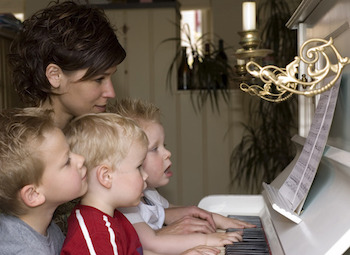As your child starts to grow, its easy to become overwhelmed at the possibilities that lie in front of you. You want them to have the best opportunities, be exposed to all the right things. So naturally you start signing them up for classes in order to expose them to the right things at the right time.
Parents know this. But so do businesses.
Which is why you’ll find all kinds of activities being offered and promoted to parents, trying to capture attention at early ages and in more unique ways.
If a child can barely stand, you would never put them in a a soccer class. You would look for activities that help them be more coordinated and better balanced first.
But what about music? We’ve all seen the child prodigies that are playing Bach and Beethoven by the age of three. Can music be introduced at an early age and have it stick with a child?
While there are the prodigies in the world, and every child has his or her own unique talents, the answer is no. Some kids can take up piano lessons at the age of three and move forward in a big way. Others don’t take it seriously until they are much older, sometimes in their teens. And while there is no “perfect age” for starting to play the piano, there are some general guidelines you can follow.
There are two ways of learning piano: by ear and by reading music.
When a child plays by ear, they mimic a sound they are being exposed to. They can follow rhythm and even create specific tunes simply by hearing things and trying their best to recreate the sound. They love experimenting, and love to do so in an environment where others are playing too.
Children at this level can learn at any age. But being forced into one on one lessons probably won’t help them grow. Instead, they want to “play”. The more fun you make it, the more they will love the concept of making music.
At some point, a child begins to understand there can be structure to making music. They develop the ability to read, to understand letters and numbers, and understand the concept that letters make words that fill them with information. They have the ability to sit still for a story, and their focus can stay with a task for a few moments of time.
This can be as early as three for some kids, but for the majority it will occur around five or six. This is when reading music can become a part of their lives and have more meaning.
A child needs to understand the concept of “C”, then transfer that concept to a staff of music, realizing that the “C” also becomes a note that can be played on a keyboard. And not just middle C, but also the different octaves that create music.
A difficult concept to grasp. And if you try and force it too young, your child will become frustrated and possibly turn away from music forever.
Above all, remember music should be fun, not a chore. The more fun you make it, the more the love of the piano will grow. And that is where the true benefits lie.

